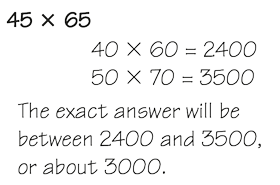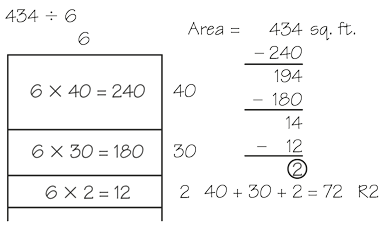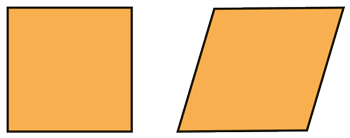R
range (finding a)
The range of a set of data is the difference between the highest and lowest numbers in the data.

pages 138–139
ratio
A way to compare two numbers or quantities using division. It is often written as a fraction. For example:  or 3 miles per 2 hours.
or 3 miles per 2 hours.
pages 217–219, 225–229, 230, 233–234, 236–237, 239, 335, 356, 487, 518–525, 526–536, 537–542, 560–581
rectangle
A quadrilateral with four right angles.

pages 281, 288–289, 291–292
rectangle method
Using a rectangle as a tool to help solve multiplication problems.

pages 137, 174, 176, 179–180
rectangle model (for division)

reducing fractions
The act of finding equivalent fractions so the numerator and denominator have no factor in common except 1. For example: 

pages 211, 215, 488
regular polygon
A polygon is regular if all sides are of equal length and all angles
are equal.

page 289
remainder
Something that remains or is left after a whole number division problem. The portion of the dividend that is not evenly divisible by the divisor; e.g., 16 ÷ 5 = 3 with 1 as a remainder.
pages 300, 303–304, 309
responding variable
The variable whose value results from the experiment. Experimenters find the values of the responding variable by doing the experiment. The responding variable is often called the dependent variable.
pages 351, 353
rhombus
A quadrilateral with four sides of equal length.

pages 288–289, 291–292
right angle
An angle that measures 90o.

pages 249, 278–280, 290–292
right triangle
A triangle that has one right angle.

pages 194, 279, 283
rounding
Replacing a number with the nearest convenient number.
pages 126–127, 136, 379, 406, 557–559
row
In an array, the objects lined up horizontally, or going across.

pages 55, 57, 137, 184, 187, 196–197, 370, 461










